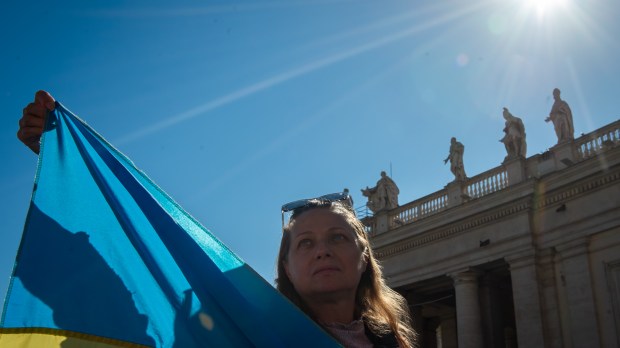Every day, Aleteia offers a selection of articles written by the international press about the Church and the major issues that concern Catholics around the world. The opinions and views expressed in these articles are not those of the editors.
Tuesday 15 November 2022
1. Ukraine: the challenges of the post-war period as seen by Archbishop Shevchuk
2. The DRC: Bishops warn of growing insecurity
3. Kyrgyzstan plans to build its first cathedral
4. Number of students attending catechism classes in Warsaw continues to decline
5. Why eating from the tree of knowledge is forbidden in the Garden of Eden
~
“I have hope,” says the Major Archbishop of the Ukrainian-Greek Catholic Church, Sviatoslav Shevchuk, who was in Rome for a week. He praised the “great listening” he received from the heads of the Dicasteries and the “fatherly warmth” he felt from Pope Francis. Interviewed by Aci Stampa, the Ukrainian Archbishop discussed solutions to resolve the conflict, which the Holy See wants to end “as soon as possible.” He explained that he had conveyed to the Secretary of State the gratitude of the families of the prisoners who have been freed thanks to the efforts of the Holy See and Pope Francis. Now Archbishop Shevchuk expects support from Rome for the “great humanitarian challenge” facing them, with a winter that promises to be very difficult. The reconstruction, he assures, must be done “based on Christian principles.” The future of Ukraine’s relationship with its Russian neighbor remains “an open question,” says the Archbishop, explaining that “without clear moral foundations” Russia will not heal the “diseases” it inherited from the post-Soviet era. “With this war, the Russians want to solve their internal problems by external aggression. We are called upon to avoid this temptation,” he explained. The Catholic Church now intends to defend democratic values in Ukrainian society before turning to the “long process” of reconciliation with Russia, which Archbishop Shevchuk insists must be preceded by justice.
Aci Stampa, Italian
2The DRC: Bishops warn of growing insecurity
On Friday, November 11, the Bishops of the Democratic Republic of Congo decided to publish a statement to sound the alarm on the security situation in the country, reports Lucie Sarr of La Croix Afrique. The reason for this concern is the growing hold that the M23 rebel movement, “with military support from Rwanda and even Uganda,” has been getting in North Kivu, an eastern region of the country which has been caught in a struggle for years. As deaths continue to rise in a context of ethnic conflict, fueled by “predators” who want to grab the region’s great wealth, the Congolese Bishops are calling on the international community to intervene. They denounce it’s hypocritical attitude, as well as that of multilateral organizations, considering that they have “levers” to push for justice for the Congolese people The Bishops also ask the government to reduce its “lifestyle” in order to contribute “actively” to the efforts to reduce this instability. They also invite the authorities to judge the many war criminals who remain in the country with impunity.
La Croix Africa, French
3. Kyrgyzstan plans to build its first cathedral
Kyrgyzstan will soon have its first Catholic Cathedral. The religious building will rise in the heart of the capital Bishkek, and its foundation stone has already been blessed by Pope Francis. It should be finished within three years.
Fides, English.
4. Number of students attending catechism classes in Warsaw continues to decline
The proportion of Warsaw students attending Catholic catechism classes, which are optional, has continued to decline, and is now below 30%. As Warsaw appears increasingly secularized, two senior Church officials warned last week that young Poles are continuing to turn away from the Church, with a growing number leaving altogether in a “wave of apostasies.”
Notes from Poland, English
5. Why eating from the tree of knowledge is forbidden in the Garden of Eden
Father Richard Kocher published an essay on the issue of a theology focused exclusively on man, at the risk of losing sight of God. This is a temptation that one finds in the first pages of Genesis, in the story of Adam and Eve, he explains. By eating the forbidden fruit, the first two people wanted to make themselves “autonomous” from God.
Die Tagespost, German

